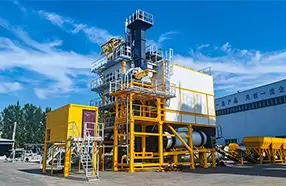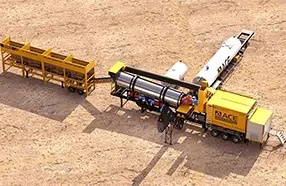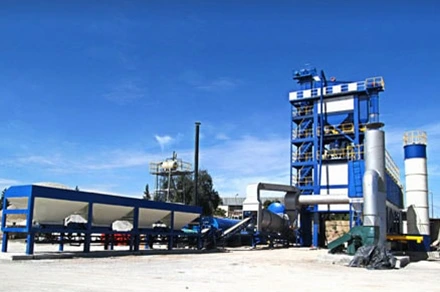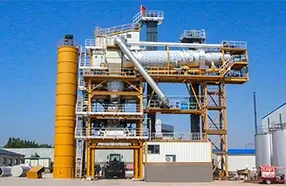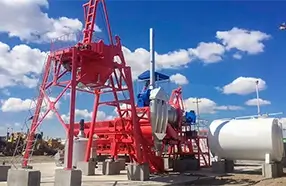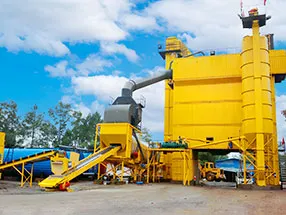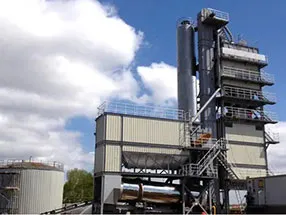Types of Asphalt Plants
So many types of asphalt mixing plants, small/Large, mobile, batch/discontinuous, drum/continuous hot mix plants, are available on market. Learn about types of asphalt mixing plants here. When you decide to get your own one, the first issue you have to address is to determine what type of hot mix plant you’d like to purchase.
What's the basis of classification? What's the difference between these types? What characteristics are available for each type? What type of mixing plants are most suitable for your road construction projects? For your convenience, we have put together everything you would like to know about types of hot mix plants and explain them in detail here.
CONTENTS
- 1. Small/Medium/Large Type Asphalt Plant - Based On Production Capacity
- 2. Stationary/Semi-stationary/Mobile Type Asphalt Plant - Based on the Mobility
- 3. Batch Mix/Drum Mix Type Asphalt Plant - Based on the Mixing Method
- 4. Eco-friendly/Traditional Type Asphalt Plant - Based on Environmental Effectiveness
- 5. Resource Recycling/Non-recycling Type Asphalt Plant - Based on Resource Recycling Feature
There have been more and more types around asphalt mixing plants emerging since it comes out. Almost each of them represents a kind of hot mix plant with unique functions that play an important part in meeting some special needs appearing during the pavement process. There are several types of hot mix equipment available these days, and these types vary with different classification basis.
1. Small/Medium/Large Type Asphalt Plant
Classification Declaration
- Based on production capacity, asphalt mixing equipment can be divided into three types: small/mini, medium and large.
- In the eyes of different manufacturers or users from different countries, sorting methods vary greatly.
- From our point of view, hot mix plants with a capacity below 40t/h are considered as small type. Medium type usually has capacities ranging from 40t/h to 400t/h. The ones with a capacity of more than 400t/h are defined to be large hot mix plants.
- There are other viewpoints, for example, someone regard ones with capacity from 20t/h to 100t/h as small and medium hot mix plants, yet large ones have a capacity of more than 100t/h.
- No matter how to sort them by production capacity, small and medium mixing equipment are fit for relatively small and medium-scale road construction projects and so forth, while the large ones are suitable for bigger road construction projects.
SLB Series Small Asphalt Mixing Plant
SLB series asphalt drum mix plant for sale manufactured by LYROAD Machinery with a capacity between 8 t/h and 30 t/h is typically a small mixing device, always used in small construction projects.
JJW Series Asphalt Mixing Plant
JJW5000 asphalt batch mix plant, with 400t/h production capacity, is a large one without a doubt. It's ideal hot mix equipment for projects that require a substantial amount of finished mixture.
2. Stationary/Semi-stationary/Mobile Type Asphalt Plant
Classification Declaration
- According to the mobility, all hot mix plants can be divided into mobile, semi-stationary and stationary.
- Mobile ones can be transferred with the construction site, because they are mounted on chassis, and their aggregate silos and mixers are equipped with tires
- semi-stationary asphalt mixing plant is installed on several trailers and can be reassembled when it arrives at the new construction site.
- The stationary plant, also known as asphalt concrete processing factory, has its operation site fixed in a place, can’t move around during the construction process.
- The finished mixture produced by mobile mixing plants doesn’t have to be transported to the required location, while stationary mixing equipment needs vehicles to transport finished mixture to the designated spot.
- Mobile plant is suitable for the county, township highways, and grade highway projects; Semi-stationary one is mostly used in road construction; Stationary one is suitable for urban road construction projects with large scale and high-quality requirements.
YLB Series Mobile Asphalt Mixing Plant
YLB Series mobile asphalt mixing plant, one of LYROAD Machinery’s main products, is becoming increasingly popular due to ease of relocation and reinstallation.
LB Series Asphalt Batch Mix Plant
Our LB series batching plant is typically an example of the stationary plant.
3. Batch Mix/Drum Mix Type Asphalt Plant
3D Display Video of Mixing Process
Mixing Process Of Asphalt Batch Mix Plant
Cold aggregates are sent to the drying drum first, and then after being dried, heated, and sieved, the aggregates will be batched into the mixer. Finished mixture will be created one batch by another after each batch of aggregates mix with mineral powder and heated liquid bitumen in the mixer.
Heating and Mixing Process of Asphalt Drum Mix Plant
Cold aggregates go into the non-stop rotating drying drum by conveyor belt, in which cold aggregates are dried and heated in sequence. The nozzle in the drying drum continuously sprays the bitumen, and mixture comes out uninterruptedly with the drum rotating.
Classification Declaration
- Asphalt batching equipment makes small accurate batches of the mixture through a process repeated over and over again until the total tonnage for a project has been manufactured, so it’s also called intermittent or discontinuous type. On the other hand, asphalt drum mix plant makes finished mixture through a continuous process, requiring silos for temporary storage prior to the mixture being transported to the paving location.
- Batching plants manufacture a very high-quality finished product due to their accurate measurement system and precise screening system. What’s more, they offer the highest level of flexibility in the production process, and operators can easily switch back and forth between different mixture recipes if necessary. Drum mix type can't change the recipe during the production process, and the quality of the finished mixture is relatively lower.
- Batching plant has one drying drum and one mixer, but asphalt drum mix plant we usually mention has only one drum that combines drying and mixing functions together. In addition, there is one more type of drum mix plant, double drum or double barrel plant, which has an outer shell through which the aggregate flows before coming in contact with the hot air inside the chamber.
- Basing on how the aggregate flows in relation to the hot air, all drum mix equipment can be divided into the parallel-flow type and counter-flow type. In parallel-flow plants, the aggregate and airflow in the same direction through chambers, with an opposite direction in counter-flow plants.
LB Series Asphalt Batch Mix Plant
LB series asphalt batch mix plant manufactured by LYROAD Machinery has been exported many sets to a number of countries, making it our flagship series.
DHB Series Asphalt Drum Mix Plant
DHB series continuous asphalt drum mix plant, very suitable for small and medium-sized road construction projects that quality requirement is not that high.
4. Eco-friendly/Traditional Type Asphalt Plant
Classification Declaration
- Hot mix plants for sale can fall into eco-friendly type and traditional type according to the environmental influence that they bring.
- Eco-friendly hot mix plants adopt special environmental protection measures to significantly reduce air pollution and noise emissions. Traditional type generally doesn't adopt these measures.
- Environmental protection measures include enclosed belt conveyors, enclosed mixer tower, high-efficiency activated carbon to filter bitumen smoke, superior dust collecting system, central control system to avoid hot aggregate overflow, etc.
JNW Series Asphalt Batch Mixing Plant
Our JNW series batching plant adopts environmental protection measures as much as possible, it not only saves energy, reducing production cost, but also minimizes any possible pollution.
Traditional LB Series Asphalt Plant
Traditional asphalt mixing plant's environmental effectiveness is lower than ELB, JJW, JNW series eco-friendly ones.
5. Resource Recycling/Non-recycling Type Asphalt Plant
Classification Declaration
- By using hot recycling technology, some mixing plants can be classified as asphalt recycling plants (also called hot recycled asphalt plant). This type can fully make use of RAP, one kind of old asphalt mixture, save fuel and material, reduce pollution and waste, bring better economic and environmental benefits.
- Asphalt fumes and harmful gas can be recycled into drying drum and burn again, reducing harmful fume emission; multi-stage dust collecting system can help reduce dust emission
RLB Asphalt Recycling Plant
Using hot recycled asphalt plant RLB series, well-accepted equipment manufactured by LYROAD Machinery, RAP proportion can be up to 50%.
QLB Mobile Hot Mix Plant
Because recycling techniques are not used, such mixing plants can only produce finished mixture with all-virgin materials.
6. Containerized/Non-containerized Type Asphalt Plant
Classification Declaration
- According to the structure design, there are containerized asphalt plants. The containerized asphalt plant with modular design makes it easy to use the plant on different sites, providing convenience for road construction while reducing transportation and installation costs.
- With the dual stage dust collector and containers, dust emission will be largely reduced. It is suitable for customers who have stringent environmental requirements.
CFB Containerized Asphalt Mixing Plant
Containerized asphalt mixing plant without foundation can save your cost and installation time. And dust emission in exhaust <20mg/Nm³. CFB series containerized asphalt mixing plants adopt German screening technology, which can improve screening efficiency and reduce energy consumption.
ALB Advanced Stationary Asphalt Plant
Such non-containerized asphalt batch mix plants need foundation. They are not easy to install and dismantle. And the cost is higher than containerized asphalt mixing plant. ALB series stationary asphalt plant is designed with advanced technology which is tailored to medium and large projects.
One by one new classification basis will be born in the future, and the number of types is expected to increase. In the actual purchase and use process, stationary type, mobile type, small portable type, drum mix type, batch mix type, eco-friendly type, asphalt recycling type, etc, these basic types mix each other, forming many combination types. However, no matter what type of hot mix plant you would like to choose, it’s important for you to take every aspect of your projects, your configuration requirement, your purchase budget, and the like into consideration ahead of time.
If you have any queries regarding how to choose the type of mixing equipment, please feel free to get in touch with us. We will reply to you as soon as possible.


